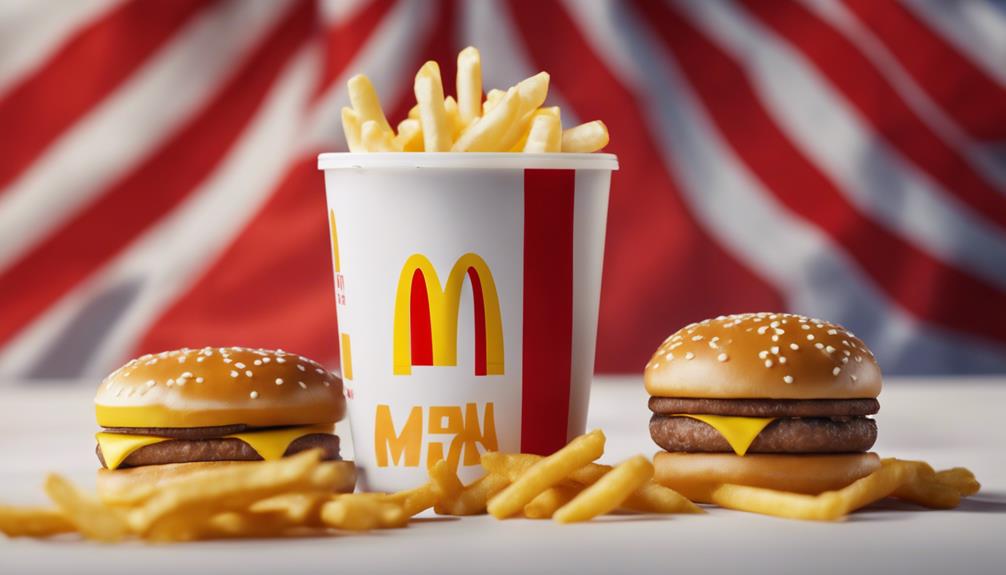McDonald's strategically raised prices globally to navigate challenges, especially in Russia and China. The prices hikes balanced out financial woes, showcasing the company's proactive approach. CEO Chris Kempczinski remained optimistic despite internal tensions. These adjustments emphasize the company's commitment to stabilizing performance. The U.S. also faced a menu price increase to counter rising expenses. McDonald's dynamic pricing strategies are key to market resilience. The sustained performance and popularity of the 'Happy Meal' reflect McDonald's stability. Discover more about McDonald's global strategies and market insights.
Key Takeaways
- McDonald's price hikes offset financial losses in Russia and China.
- Strategic pricing adjustments helped stabilize performance in challenging markets.
- Steps were taken to protect trademarks in Russia amid market difficulties.
- Price increases in the U.S. balanced out escalating commodity and labor costs.
- CEO Kempczinski's optimism reflected the company's proactive approach to financial obstacles.
Global Impact of McDonald's Price Hikes
McDonald's strategically implemented price hikes globally to counter financial challenges in Russia and China. These price increases weren't isolated adjustments but part of a larger strategy to navigate through market difficulties.
The impact of these pricing strategies had a significant global reach, contributing to maintaining the overall performance of the company. Despite facing challenges in key markets, McDonald's remained resilient as the price hikes effectively balanced out the woes in Russia and China.
The global impact of these price adjustments showcased the company's ability to adapt to varying economic landscapes and maintain a competitive edge. By implementing price hikes across different regions, McDonald's demonstrated a proactive approach to addressing financial obstacles and ensuring stability in the face of market uncertainties.
This strategic decision underscores McDonald's commitment to sustaining its global presence and financial performance amidst challenging conditions.
Challenges in Russia and China

Facing financial challenges in Russia and China due to geopolitical issues, the fast-food giant encountered obstacles that required strategic maneuvers to navigate successfully. Price hikes played a significant role in helping McDonald's offset woes in Russia and China, mitigating some of the financial losses experienced in these markets.
Despite the difficulties, CEO Chris Kempczinski remained optimistic about the company's future. In response to the challenges, McDonald's also took steps to enforce its trademarks in Russia, demonstrating a commitment to protecting its brand in the face of adversity. It's worth noting that amidst the turmoil, there was a board fight at McDonald's, highlighting the internal tensions that can arise during times of external pressure.
Despite the setbacks, McDonald's hasn't completely ruled out the possibility of returning to the Russian market in the future, indicating a willingness to overcome the challenges and adapt to the evolving business landscape.
U.S. Menu Price Increase Effects

U.S. menu prices at McDonald's saw an 8% increase in the first quarter, surpassing last year's figures. These price hikes were a strategic move to counterbalance the impact of escalating commodity and labor expenses.
It will be interesting to observe how this uptick in costs influences consumer spending behavior at the fast-food giant.
U.S. Price Impact
Having implemented an 8% increase in menu prices, McDonald's in the U.S. has successfully offset financial challenges experienced in Russia and China. The price hikes in the U.S. market played a pivotal role in easing the impact of troubled markets like China, contributing to McDonald's overall revenue performance.
These adjustments were a strategic response to rising commodity and labor costs, allowing the company to navigate the effects of inflation on its operations more effectively. By implementing menu price increases in the U.S., McDonald's managed to mitigate financial losses experienced in other regions, showcasing the interconnected nature of its global operations.
This move highlights the company's proactive approach to maintaining financial stability amidst evolving market conditions. The adjustment in U.S. menu prices not only reflects the economic realities faced by the fast-food giant but also demonstrates its ability to adapt to challenges while endeavoring to meet consumer demands.
Consumer Spending Behavior
McDonald's menu price increases in the U.S. have directly influenced consumer spending behavior, prompting some customers to opt for more affordable menu items or reduce their orders in response to the recent 8% hike. The rise in menu prices during Q1 compared to the previous year led to a shift in consumer choices, with some individuals seeking cheaper alternatives or cutting back on their purchases.
Despite these adjustments, McDonald's experienced a 3.5% increase in same-store sales in the January-March period. This 8% surge in menu prices was a strategic move by the company to counterbalance escalating commodity and labor expenses. While the price hikes impacted consumer behavior in the U.S., they helped offset financial challenges faced by McDonald's in Russia and China.
The balance between menu prices and consumer spending behavior highlights the delicate equilibrium that fast-food chains navigate to maintain profitability while meeting customer demands.
Strategic Pricing Adjustments

McDonald's strategic pricing adjustments in response to financial challenges in Russia and China proved effective in offsetting market woes.
By implementing price hikes, the company successfully navigated the difficulties faced in these regions, demonstrating a proactive approach to stabilizing its financial performance.
These strategic pricing decisions not only helped mitigate losses but also set a foundation for future market resilience and growth.
Price Strategy Success
The successful implementation of strategic pricing adjustments by the fast-food chain helped offset financial losses in Russia and China. By introducing price hikes and adjusting menu prices, McDonald's navigated the challenges brought about by the COVID-19 pandemic, easing the financial strain caused by closures in Russia and market difficulties in China. The company's proactive approach to enforcing trademarks in Russia also played a role in their pricing strategies, contributing to a more balanced financial outlook in these key markets. Despite the hurdles faced, CEO Kempczinski remains optimistic about the future of McDonald's.
| Price Strategy Success | ||
|---|---|---|
| Key Factors | Impact | Market |
| Strategic Price Adjustments | Offset financial losses | Russia & China |
| Price Hikes | Balancing impact of closures | US |
| Menu Prices | Mitigating challenges | Global |
This table illustrates how strategic pricing adjustments, including price hikes and menu price changes, have positively influenced McDonald's financial performance in various markets.
Market Response Analysis
Strategic price adjustments in response to market dynamics have proven instrumental in McDonald's ability to navigate financial challenges in key regions such as Russia and China. Amidst COVID restrictions and economic uncertainties, McDonald's said that implementing price hikes helped offset woes in these markets.
By raising menu prices and easing the impact of closures and operational difficulties, the company managed to maintain financial stability. In the US, McDonald's raised menu prices by 8% to counter inflation and challenges in key markets, showcasing its flexibility and adaptability in the face of adversity.
These pricing strategies played a significant role in balancing out the negative effects of market challenges, demonstrating McDonald's proactive approach to managing financial pressures. The strategic pricing adjustments not only helped McDonald's overcome difficulties but also highlighted the importance of dynamic pricing strategies in responding to evolving market conditions.
Managing Market Setbacks

Despite facing challenges in key markets, McDonald's managed to navigate setbacks through strategic price adjustments. The company implemented price hikes to offset financial losses in Russia and China, helping to mitigate the impact of the difficulties faced in these markets.
By enforcing trademarks in Russia and leaving the possibility of returning in the future, McDonald's demonstrated a commitment to managing setbacks and maintaining a presence in these important regions. CEO Kempczinski's optimism for the future, despite the challenges encountered in Russia and China, reflects a strategic approach to addressing market setbacks.
Through these measures, McDonald's not only managed to offset troubled markets but also ensured the ability to pay its 62,000 employees, showing resilience in the face of adversity. McDonald's ability to adapt and strategize in response to market challenges highlights its commitment to long-term success and stability.
Evaluating Operations in Russia and China

Facing challenges in Russia and China, McDonald's operational strategies are undergoing thorough evaluation. The company said that price hikes were instrumental in offsetting financial losses in Russia and China.
In Russia, McDonald's faced operational difficulties due to geopolitical and economic factors, prompting the need for a reassessment of its approaches in the market. Despite these challenges, the company took steps to protect its trademarks in Russia.
In China, McDonald's also encountered obstacles but managed to navigate through them with the help of price adjustments. The CEO, Kempczinski, expressed optimism for the future, highlighting the importance of adapting to the evolving circumstances in both countries.
The strategic evaluation in Russia and China reflects McDonald's commitment to overcoming setbacks and enhancing its performance in these key markets.
Sustained Performance Amid Uncertainties

Overcoming challenges in Russia and China, McDonald's continued to demonstrate resilience and adaptability in maintaining its performance amid uncertainties. Despite facing pressure in these key markets, the company strategically adjusted prices to offset financial challenges and sustain its operations.
McDonald's ability to navigate through closures and geopolitical issues in Russia and China highlights its commitment to overcoming obstacles and delivering consistent results. In the first quarter, the company's strategic price hikes helped mitigate the negative impacts of market uncertainties, showcasing its ability to pivot and adapt to changing circumstances.
While challenges persist in certain regions, McDonald's performance in the United States remained steady, with the iconic 'Happy Meal' continuing to be a popular choice for customers. As McDonald's pivots on pigs and focuses on strategic pricing adjustments, its sustained performance amid uncertainties underscores its resilience and ability to thrive in a volatile market environment.
Frequently Asked Questions
How Much Is a Mcdonald's Meal in Russia?
In Russia, the cost of a McDonald's meal typically ranges from 300-400 rubles. Recent price increases stem from factors like inflation and currency devaluation. McDonald's implemented these adjustments to counter financial challenges in Russia and China.
Russian consumers faced difficulties with store closures and higher prices. McDonald's exit from Russia further impacted meal availability and costs for local customers.
Why Does China Have so Many Mcdonald's?
China has a vast number of McDonald's due to the country's booming economy, rapid urbanization, and the rising middle class. The appeal of Western fast food, McDonald's included, has surged as Chinese consumer preferences evolve.
The chain's success in China is also attributed to tailored menu offerings like the McSpicy Chicken Burger and Taro Pie. Strategic partnerships, effective marketing, and adapting to local trends have solidified McDonald's position as a popular dining choice in China.
What Percent of Mcdonald's Sales Are in Russia?
Approximately 2% of McDonald's global sales were from Russia before the closures. The temporary shutdown of 850 stores in Russia led to an estimated $55 million monthly sales loss.
Despite this setback, McDonald's had a significant presence in Russia with numerous stores and employees. Exiting the Russian market and selling stores was a strategic move to counter financial losses and market uncertainties.
With plans to retain all 62,000 employees during the reorganization.
What Happens to Mcdonald's in Russia?
In Russia, McDonald's is facing challenges due to the closure of 850 stores, which has led to a significant impact on their sales. The company is evaluating options and considering selling its stores in the country.
Despite the closures, McDonald's continues to pay its 62,000 employees. The situation remains fluid, and updates are expected by the end of Q2.
The cost of closure in Russia is substantial, amounting to around $55 million per month in lost sales.
Conclusion
To sum up, McDonald's price hikes have miraculously turned around their struggles in Russia and China, offsetting any potential setbacks. Despite challenges in these markets, strategic pricing adjustments have allowed for sustained performance worldwide.
The impact of menu price increases in the U.S. has also been felt positively. McDonald's ability to manage market woes while evaluating operations in key regions highlights their resilience and adaptability in the face of uncertainties.










